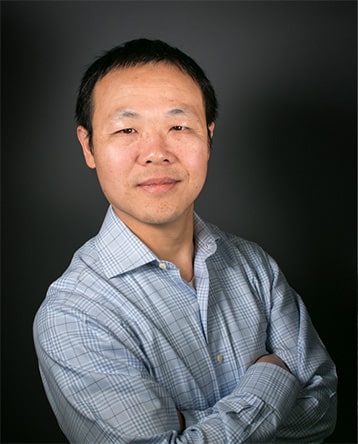
Designing A National Institute For AI In Construction
By Dan Carroll
Media Inquiries
Dan Carroll
- College of Engineering
Carnegie Mellon University's Pingbo Tang and Burcu Akinci are part of a team that is designing the future National Institute for Artificial Intelligence (AI) in Construction, in coordination with researchers from The University of Illinois at Urbana-Champaign and over 40 industry partners.
Akinci, professor of civil and environmental engineering (CEE) and associate dean for research, and Tang, associate professor of CEE, are currently helping develop the groundwork for the institute, which will investigate and develop ways to integrate rapidly evolving machine learning and AI technology into modern construction work.
"This National Artificial Intelligence Research Institutes Planning award supports research and coordination activities to build collaborations among AI researchers, construction researchers, and industry partners, with the aim of forming an Institute for AI in Construction," the researchers wrote in their summary. "This research will identify AI problems in the construction domain that can serve as model problems, uncover novel conceptual challenges to AI research from construction applications, and identify likely dataset needs to support future research on AI in construction."
Tang, a 2009 alumnus of CEE, joined CMU's College of Engineering last fall after having spent seven years as a faculty member at Arizona State University.
Much of Tang's recent work has focused around risk analysis and the human element within potentially high-risk situations.
For instance, one project simulated various conditions and actions taken by both taxiing aircraft and aircraft controllers. The work combined metrics such as aircraft trajectories and distance from one another, as well as more subtle factors involved with individual awareness and communication, to determine what conditions put aircraft at high risk of an accident while on the runway.
A similar project examined the conditions affecting nuclear engineers during crucial handoff situations. By simulating the thought processes and communication ability of those involved, Tang's work is helping identify and avoid potential errors in high-risk scenarios.
Another major thrust in Tang's work is infrastructure analysis. Partnering with the University of Illinois as part of a National Science Foundation Convergence grant, he's outlined a methodology they're using to analyze bridge infrastructure for renovation based on the socioeconomic impact of its design and location. This is imperative at a time when the decline of America's infrastructure is coinciding nationally with demands for equitable distribution of resources.
Akinci, professor of civil and environmental engineering (CEE) and associate dean for research, and Tang, associate professor of CEE, are currently helping develop the groundwork for the institute, which will investigate and develop ways to integrate rapidly evolving machine learning and AI technology into modern construction work.
"This National Artificial Intelligence Research Institutes Planning award supports research and coordination activities to build collaborations among AI researchers, construction researchers, and industry partners, with the aim of forming an Institute for AI in Construction," the researchers wrote in their summary. "This research will identify AI problems in the construction domain that can serve as model problems, uncover novel conceptual challenges to AI research from construction applications, and identify likely dataset needs to support future research on AI in construction."
Tang, a 2009 alumnus of CEE, joined CMU's College of Engineering last fall after having spent seven years as a faculty member at Arizona State University.
Much of Tang's recent work has focused around risk analysis and the human element within potentially high-risk situations.
For instance, one project simulated various conditions and actions taken by both taxiing aircraft and aircraft controllers. The work combined metrics such as aircraft trajectories and distance from one another, as well as more subtle factors involved with individual awareness and communication, to determine what conditions put aircraft at high risk of an accident while on the runway.
A similar project examined the conditions affecting nuclear engineers during crucial handoff situations. By simulating the thought processes and communication ability of those involved, Tang's work is helping identify and avoid potential errors in high-risk scenarios.
Another major thrust in Tang's work is infrastructure analysis. Partnering with the University of Illinois as part of a National Science Foundation Convergence grant, he's outlined a methodology they're using to analyze bridge infrastructure for renovation based on the socioeconomic impact of its design and location. This is imperative at a time when the decline of America's infrastructure is coinciding nationally with demands for equitable distribution of resources.
"The construction industry will welcome the next generation of AI that integrates human intelligence and machine intelligence." — Pingbo Tang
Other recent work employs deep learning algorithms in a system that can detect leaks in canals using satellite imagery. The algorithm incorporates not only image data, but layers data on land surface temperature, degree of vegetation coverage and vegetation dryness to determine where water may be escaping.
Tang's background in infrastructure analysis and risk analysis makes him an ideal choice for a role in the National Institute for Artificial Intelligence in Construction.
"The construction industry will welcome the next generation of AI that integrates human intelligence and machine intelligence," said Tang. "Humans, as intelligent machines that learn from daily life, can collaborate with machine intelligence to tackle construction spaces in an open world full of uncertainties."
Tang's background in infrastructure analysis and risk analysis makes him an ideal choice for a role in the National Institute for Artificial Intelligence in Construction.
"The construction industry will welcome the next generation of AI that integrates human intelligence and machine intelligence," said Tang. "Humans, as intelligent machines that learn from daily life, can collaborate with machine intelligence to tackle construction spaces in an open world full of uncertainties."

